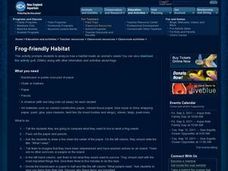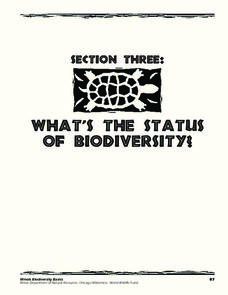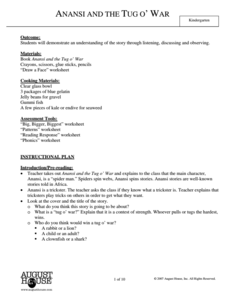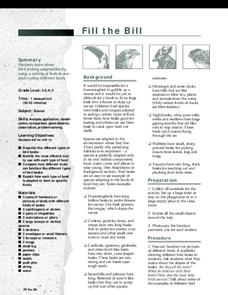Desert Discovery
Leaping Lizards
Here is a fine biology instructional activity that introduces youngsters to reptiles. They study their feeding habits, their habitats, and the adaptations they must make to survive in their environments. The outstanding instructional...
Curated OER
Bottle Habitat
In groups of four, students construct aquatic habitats in pop bottles. They create charts and record data from observations over a four week period. Then they graph their data and write explanations for what they observed.
Curated OER
Frog Friendly Habitat
Students create a frog friendly habitat. In this animal habitat lesson, students study what animals need to survive and then create a frog habitat from a shoe box. Students write a report about frogs and present their habitats to the class.
Curated OER
Ecology Lessons
Students examine the relationship between animal adaptations, habitats and community interactions. In this ecology instructional activity students complete a skull detective worksheet then use their knowledge to analyze a skull.
Curated OER
Explore Your Natural Habitat
Students identify habitats and understand why they are important to our environment. In this environmental lesson students design their own habitat, observe and record data on the impact their habitat has on the environment.
Curated OER
Deserts: How Do You Define One?
Second graders identify what constitutes as a desert by reading a habitat checklist. In this environment lesson plan, 2nd graders read a nature website to discover facts about the desert and where they are located. Students utilize art...
Curated OER
Teaching Kids about the Environment
Fifth graders identify the species of plants and animals found in an environment. They compare these findings to plant and animal species found in an unlike environment. Students acquire and compare soil samples from the two sites chosen.
Curated OER
ENDANGERED SPECIES LESSON
Students, after reading and discussing a science research prompt, gather information about a particular endangered species and present findings to the class, by completing a research workbook and making a realistic sketch of the animal.
Curated OER
Learning the Causes of Extinction
Students are introduced to the five major reasons for extinction. In groups, they read scenarios and divide them into different categories. Using the internet, they identify which reason a certain animal became extinct. To end the...
Curated OER
Plants and Animals
Students find common needs between plants and animals. In this plants and animals lesson students compare that both plants and animals need food and water. They also find the differences between plant and animal needs.
Curated OER
What does 'Endangered' mean?
Students discuss a variety of teacher led discussion questions about what makes an animal endangered. They take a short field trip to an open area and set a boundary for each child for them to either write or draw about how the location...
Illinois Department of Natural Resources
Section Three: What's the Status of Biodiversity?
Biodiversity is essential for every habitat, but many species are at risk due to pollution and other factors. Explore several different species native to Illinois in a gallery walk with posters that learners have created after research...
Aquarium of the Pacific
Kelp Forest Habitat
What forest is in the ocean? The class watches a video that introduces the kelp forest and the parts of kelp. Learners dive into the ocean and see what different species live near the canopy, the midwater, and the bottom of the kelp...
Curated OER
Wild Animal Investigation - Habitat Diorama
Students research wild animals in cooperative groups and use their information to construct habitat dioramas. They demonstrate competence in using different information sources, including those of a technical nature, to accomplish...
SeaWorld
Design a Fish
Craft some neat refrigerator magnets while studying ocean animals with a lesson about the anatomy of a fish. After kids learn about the different parts and shapes of fish, they use modeling compound to design their own fish.
Howard Hughes Medical Institute
Ocean Acidification
Human impacts on the environment can sometimes be difficult to measure, especially under water! An activity centered on ocean acidification gives science scholars the opportunity to examine the effects of carbon dioxide on marine life....
August House
Anansi and the Tug o' War
Combine art, math, language arts, drama, and delicious Jell-o with a instructional activity based on the African folktale Anansi and the Tug o' War. Kids make predictions and discuss plot points of the story before joining in...
NOAA
Tides
Sometimes low, sometimes high, but always in motion! Explore Earth's tidal system in the 10th interactive in a series of 13. Engaging life and earth science students alike, the versatile resource demonstrates cause and effect between...
Curated OER
Animals of China and in Asia
Students write an animal report. In this research lesson, students use varied reference materials to find information about animals that live in China and Asia. They write a report about an animal and complete extension activities such...
National Wildlife Federation
Fill the Bill
The structure of a bird's beak lends itself to specific functions. Using an assortment of everyday objects, learners mimic the behaviors of bird beaks. They learn about the habits of different birds by studying their beaks.
New York State Department of Environmental Conservation
Adaptations – Designs for Survival
What's the difference between behavioral adaptations and physical adaptations? Learn about the various ways that organisms adapt to their environment with a worksheet about the creatures of the Hudson River.
Curated OER
Animal Games
Students explore a variety of games on the Internet that will teach them about animals; they focus on the Florida panther. Students choose the activity that is of interest to them, and then rotate between the games online and the games...
Curated OER
The Elephant Ate a Banana in the Tundra
Students perform a scene with their small group. They identify an animal, act out what the animal does, where the animal would be found, and what the animal eats. They locate the animal habitats on a map.
Curated OER
Invent an Invertebrate
Design a new organism with recyclable art materials! After learning about the coastal biome, learners brainstorm challenges that a plant or animal may face. They use their ideas to create a creature, complete with environmental...
Other popular searches
- Powerpoint Animal Habitats
- Animal Habitats in Georgia
- Animal Habitats Math Games
- Animal Habitats Kindergarten
- Plant and Animal Habitats
- Lessons on Animal Habitats
- Animal Habitats Adaptation
- Math Animal Habitats
- Animal Habitats and Zoos
- Animal Habitats Bear
- Animal Habitats Webquest
- Australian Animal Habitats

























